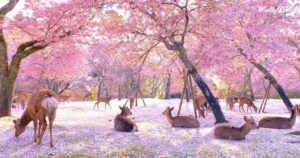Say that this scene is really great. Deer and beautiful flowering trees
Nature and animals are the priceless wealth of our planet. A person is obliged to take care of the animal world in order to preserve the for posterity. The days of zoos are over. Government Authorities are trying to find alternative methods to save animal species. Nature reserves and national parks became such a decision. Humanity has been thinking about the need to create protected areas for a long time.

The first law on the establishment of a protected natural area is considered to be the Sri Lankan law of the third century BC. A large number of national parks and reserves began to be created in the era of industrial revolutions, when there was a massive change in the original appearance of the planet. Reserves are also different from National Parks, which are created primarily to demonstrate the unique nature of the visitors. Unlike reserves, where human activity is almost completely prohibited, tourists are allowed into the territory of national parks, economic activities are allowed on a limited scale.

In Japan, there is a unique deer park where animals roam in their natural habitat. The park is especially beautiful during the flowering of the cherry trees that grow throughout the park. It is located in the city of Nara, where deer are considered sacred animals. Residents of the city have been observing the rule for more than a thousand years.

According to one legend, all local artiodactyls are descendants of the mythical deer, on which the first emperor of Japan descended from heaven. The only thing that is allowed is to buy them healthy and satisfying food. Now there are about 1,200 lazy, well-fed deer in Nara, who roam the streets of the city in herds. Nara became the capital of Japanese Buddhism. Temples and monasteries were built here according to the imperial decree. The Seven Temples of Nara (Nanto City Daiji) retained their power and influence in the religious life of the country even after the emperor’s court was moved to Kyoto at the end of the 8th century. Interestingly, around the same time, a little to the north, the main shrine of the goddess Inari was founded, where today there are thousands of bright torii gates.






